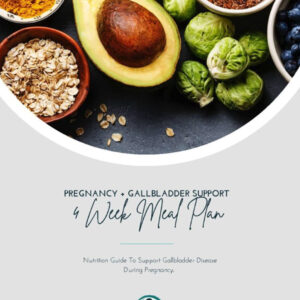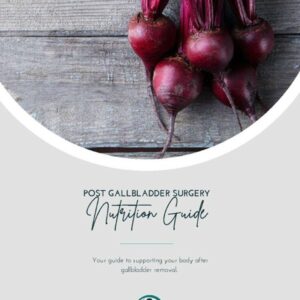5 Surprising Risk Factors for Gallbladder Disease and What You Need to Know
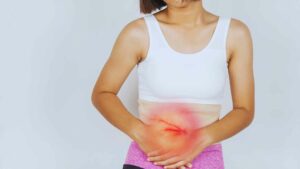
More than 20 million people in the U.S. have a diagnosis of gallbladder disease.1
As a common diagnosis, you’re not alone if you struggle with gallbladder issues.
However, it’s important to understand why you may have developed gallstones, or what risk factors may have led you to this diagnosis.
As a integrative gallbladder nutritionist and creator of Gallbladder Diet, I believe understanding the “why” behind your diagnosis is vital to learning to manage our gallbladder issues.
Gallbladder disease includes conditions such as:
- Gallstones
- Bile sludge
- Biliary dyskinesia
- Polyps
- Hyperkinetic gallbladder
- Gallbladder inflammation
I’ve learned through experience that a gallbladder diet and eating gallbladder-friendly meals are key to helping avoid these conditions.
So now I want to provide you with the tools you need to understand your gallbladder issues, and how a gallbladder diet can help you.
In this blog, you’ll learn the various causes of gallbladder issues, and we explore gallbladder-friendly dietary and lifestyle considerations that support gallbladder health.
What Causes Gallstones?
Gallstones develop when there is an imbalance in bile.
Bile is a substance our bodies need for the digestion of fats. It’s produced and secreted by the liver, and stored in the gallbladder.
When the liver produces bile that is higher in cholesterol than bile salts, we have an imbalance of bile. And this creates saturated bile that solidifies and forms sludge– which can lead to gallstones.
Another cause of gallbladder issues is bile flow. If bile flow is impaired due to poor gallbladder function– commonly called biliary dyskinesia or blocked bile ducts– the bile becomes more concentrated.
When this happens, the higher saturated bile and disrupted bile flow present a higher risk of gallstones and sludge.
Additionally, bacterial infections in the gallbladder can lead to gallbladder inflammation, which can cause the formation of gallstones.
There are several physiological ways your body can form gallstones. But now let’s dive into why you specifically may have gallstone disease in the first place.
Common Risk Factors of Gallbladder Disease
When we search for the “why” behind our gallbladder issues, we have to consider
controllable and uncontrollable risk factors.
Uncontrollable, or non-modifiable risk factors for gallbladder disease include2
- Gender
- Genetics
- Age
- Women in their fertile years
- Ethnic background
Controllable, or modifiable risk factors are often caused by dietary and lifestyle habits.
Examples include:
- Obesity, metabolic syndrome, or diabetes
- Use of certain drugs or female sex hormones
- Reduced physical activity
- Rapid weight loss
- Diet and nutrition
Between modifiable and non-modifiable risk factors, you may be more susceptible to developing gallstone disease.
And 5 risk factors, in particular, may surprise you.
I’ve done lots of research and have first-hand experience with clients who have varying risk factors. But I want to share with you some of the ones I see most so that if they apply to you, you can tackle your gallbladder issues head-on.
5 Surprising Risk Factors Leading To Gallbladder Issues
Among many others, the following 5 risk factors have been linked to an increased risk of gallstones and gallbladder issues. If any of these factors apply to you, consider connecting with me so we can discuss how to best manage your gallbladder disease.
1. Birth Control/Oral Contraceptives 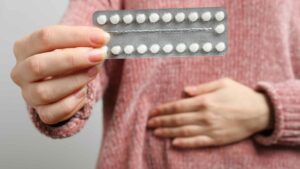
Oral contraceptives are the most common method of birth control for women all over the world. About 100 million women are on hormonal birth control pills.3
However, a summary of multiple studies states that women are 36% more likely to develop gallbladder disease if they are on hormonal birth control, compared to those who aren’t on the pill..4
If you take hormonal birth control, and you struggle with gallbladder issues, it may be time to discuss with your doctor alternative forms of birth control.
Learn even more on this subject in my blog on oral contraceptives and gallstones.
2. Low Thyroid Function or Hypothyroidism
 The gallbladder and the thyroid have a bidirectional relationship, meaning that an issue in one often causes an issue in the other.
The gallbladder and the thyroid have a bidirectional relationship, meaning that an issue in one often causes an issue in the other.
People with hypothyroidism may struggle with decreased liver cholesterol metabolism, which thickens the bile, increasing the risk of cholesterol gallstones.4
Additionally, the release of bile flow can be impaired with hypothyroidism, leading to bile duct stones and gallstones.
If you have a diagnosis of hypothyroidism, the best things to do to help prevent complications with your gallbladder are
- Improve your gut health with prebiotics, probiotics, and a gut-friendly diet
- Reduce stress in your day-to-day
- Keep your blood sugar balanced by eating meals with proteins, fibers, and healthy fats
- Support your bile flow with bitter foods, certain teas, and supplements
For more details on the thyroid-gallbladder connection, check out my blog. I go into detail on what you can do to best prevent painful and frustrating gallbladder issues from arising.
3. Nutrient Deficiencies: Magnesium, Vitamin C, Folate, and Vitamin D
Certain nutrient deficiencies can lead to the formation of gallstones.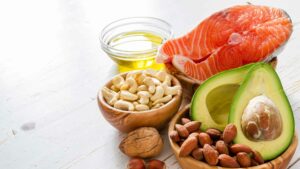
Studies show that Vitamin C, Folate, and Magnesium are linked to a lower risk of developing gallstone disease. So when you’re deficient in these nutrients, your risk for disease is greater.5
Additionally, Vitamin D helps regulate bile salts in our bodies, which prevents gallstones. So, Vitamin D deficiency can be associated with gallbladder stasis, as well as an increase in biliary calcium. And both of these factors can be a precursor for gallstones.6
Eating a balanced diet with a variety of fruits and vegetables will help you get the nutrients you need to avoid gallbladder issues.
And Vitamin D supplementation is often recommended to help avoid gallstone formation.
Check out my blog on Vitamin D and Gallstone Disease for even more tips, where I go into detail about the importance of Vitamin D– especially if you’re pregnant.
4. Gluten Intolerance/Celiac Disease
If you have a gluten intolerance or have celiac disease, you know the negative effects gluten can have on your digestion.
Gluten can influence the dynamics of gastric emptying and gallbladder contractions. And studies tell us that patients with celiac disease are more likely to have impaired gallbladder motility compared to those without any gluten intolerances.7
When you have issues with gallbladder motility, the risk of developing gallstones is greater.
For those of you with gluten intolerance, make sure to look out for symptoms of gallbladder disease. So you know how to act fast and prevent gallbladder attacks if they come on.
5. Poor Diet and Nutrition
Certain diets can lead to a slew of chronic or acute medical problems. But a few diets I’ve learned can lead to an increased risk of gallstone formation are:
- Low-calorie or restricted diets
- Diets high in refined sugars
- Diets low in fiber and high in fat and protein
A gallbladder diet that focuses on nourishing your body with whole foods and nutrients is crucial to preventing gallstones and keeping our bodies as healthy as we can.
My favorite gallbladder-friendly foods are:
- Fibers like colorful fruits, veggies, whole grains, and legumes
- Herbs like peppermint, dandelion, and artichoke
- Healthy snacks like hummus, carrots, nuts, seeds, and dried fruits
As a integrative gallbladder nutritionist, I work with all kinds of individuals to uncover the cause of their gallbladder issues.
While some factors may not be controllable, many risk factors are controllable and we must address them as soon as possible.
Diet and lifestyle are the leading cause of many controllable risk factors. Adopting a healthy, balanced diet can significantly help support gallbladder health.
I’ve created a Gallbladder Support Nutrition Guide E-book that’s full of recipes, a grocery list, a summary of gallbladder-friendly foods, and a gallbladder diet to help you avoid gallbladder issues that might arise.
And if you’re ready to take it a step further, you won’t want to miss joining the Gallbladder Saver Society.
This community of gallbladder warriors helps support you with your gallbladder issues. And I offer gallbladder-friendly educational resources and live Q and A sessions to help you get your questions answered and avoid unwanted gallbladder symptoms.
I’m here to help you find the cause of your gallbladder issues.
There’s so much I can offer you, and I can’t wait for you to take charge of your gallbladder disease to start feeling your best!
Connect with me today so we can discover YOUR root cause of gallbladder disease.
References
Unalp-Arida, A., Ruhl, C. The Burden of Gallstone Disease on the United States Population. July 10, 2022. doi: https://doi.org/10.1101/2022.07.08.22277386
Stinton LM, Shaffer EA. Epidemiology of gallbladder disease: cholelithiasis and cancer. Gut Liver. 2012 Apr;6(2):172-87. doi 10.5009/gnl.2012.6.2.172. Epub 2012 Apr 17. PMID: 22570746; PMCID: PMC3343155.
Etminan M, Delaney JAC, Bressler B, Brophy JM. Oral contraceptives and the risk of gallbladder disease: a comparative safety study. CMAJ. 2011;183(8):899-904. doi:10.1503/cmaj.110161
Wang Y, Yu X, Zhao QZ, et al. Thyroid dysfunction, either hyper or hypothyroidism, promotes gallstone formation by different mechanisms. J Zhejiang Univ Sci B. 2016;17(7):515-525. doi:10.1631/jzus.B1500210
Jessri M, Rashidkhani B. Dietary patterns and risk of gallbladder disease: a hospital-based case-control study in adult women. J Health Popul Nutr. 2015 Mar;33(1):39-49. PMID: 25995720; PMCID: PMC4438647.
Onal ED, Berker D, Guler S. Vitamin D deficiency and gallbladder stasis. Dig Dis Sci. 2015;60(12):3823-3824. doi:10.1007/s10620-015-3901-8
Massironi S, Branchi F, Fraquelli M, Baccarin A, Somalvico F, Ferretti F, Conte D, Elli L. Effects of a Gluten-Containing Meal on Gastric Emptying and Gallbladder Contraction. Nutrients. 2018 Jul 16;10(7):910. doi: 10.3390/nu10070910. PMID: 30012987; PMCID: PMC607329
